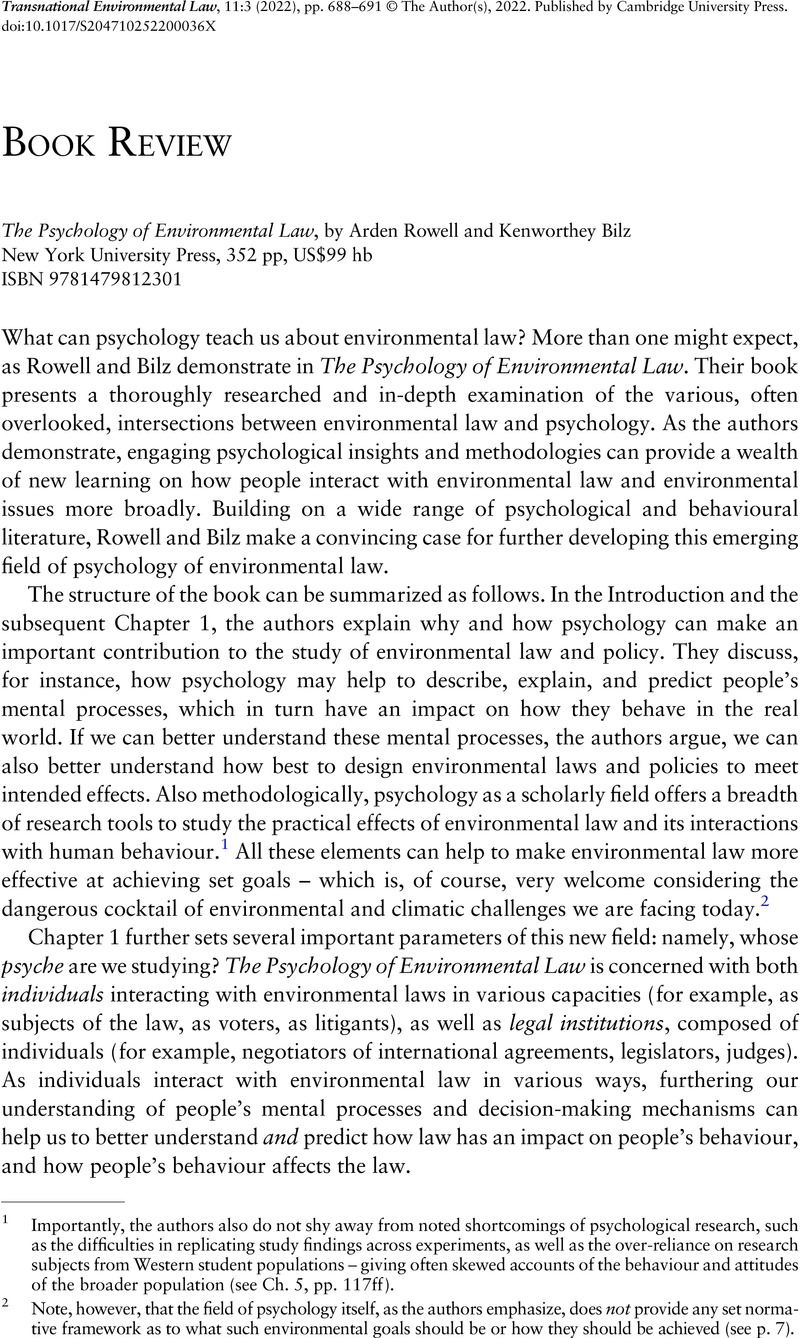No CrossRef data available.
Published online by Cambridge University Press: 21 November 2022

1 Importantly, the authors also do not shy away from noted shortcomings of psychological research, such as the difficulties in replicating study findings across experiments, as well as the over-reliance on research subjects from Western student populations – giving often skewed accounts of the behaviour and attitudes of the broader population (see Ch. 5, pp. 117ff).
2 Note, however, that the field of psychology itself, as the authors emphasize, does not provide any set normative framework as to what such environmental goals should be or how they should be achieved (see p. 7).
3 For a more philosophical discussion of this issue, see the recent work by Hawke on humans as ‘a part or apart’ from nature: Hawke, S., ‘A Part of Nature or Apart from Nature: A Case for Bio-Philiation’ (2022) 18 Visions for Sustainability, pp. 1–20Google Scholar.
4 See, e.g., McConville, M., Research Methods for Law (Edinburgh University Press, 2017)Google Scholar, Introduction.
5 In this context see van Gestel, R., Micklitz, H.-W. & Rubin, E.L., Rethinking Legal Scholarship: A Transatlantic Dialogue (Cambridge University Press, 2017)CrossRefGoogle Scholar; Gestel, R. & Micklitz, H.-W., ‘Why Methods Matter in European Legal Scholarship’ (2014) 20(3) European Law Journal, pp. 292–316CrossRefGoogle Scholar.
6 Squintani, L., ‘The Aarhus Paradox: Time to Speak about Equal Opportunities in Environmental Governance’ (2017) 14(1) Journal for European Environmental & Planning Law, pp. 3–5CrossRefGoogle Scholar.
7 See Perlaviciute, G. & Squintani, L., ‘Public Participation in Climate Policy Making: Toward Reconciling Public Preferences and Legal Frameworks’ (2020) 2(4) One Earth, pp. 341–8CrossRefGoogle Scholar.
8 See recently, e.g., Benzie, M. et al. , ‘Cross-Border Climate Change Impacts: Implications for the European Union’ (2019) 19(3) Regional Environmental Change, pp. 763–76CrossRefGoogle Scholar; Gore, M.L. et al. , ‘Transnational Environmental Crime Threatens Sustainable Development’ (2019) 2(9) Nature Sustainability, pp. 784–6CrossRefGoogle Scholar.
9 See, e.g., Borràs, S., ‘New Transitions from Human Rights to the Environment to the Rights of Nature’ (2016) 5(1) Transnational Environmental Law, pp. 113–43CrossRefGoogle Scholar; Lawrence, P., ‘Justifying Representation of Future Generations and Nature: Contradictory or Mutually Supporting Values?’ (2022) 11(3) Transnational Environmental Law, pp. 553–79Google Scholar.